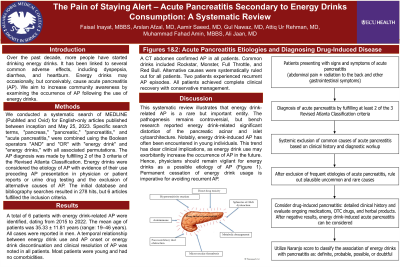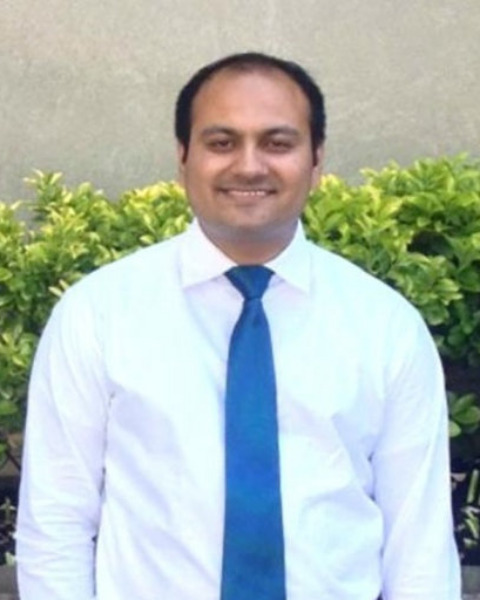Monday Poster Session
Category: Biliary/Pancreas
P1427 - The Pain of Staying Alert - Acute Pancreatitis Secondary to Energy Drinks Consumption: A Systematic Review
Monday, October 23, 2023
10:30 AM - 4:15 PM PT
Location: Exhibit Hall

Has Audio

Faisal Inayat, MBBS
Allama Iqbal Medical College
Lahore, Punjab, Pakistan
Presenting Author(s)
Faisal Inayat, MBBS1, Arslan Afzal, MD2, Aamir Saeed, MD3, Gul Nawaz, MD4, Attiq Ur Rehman, MD5, Muhammad Fahad Amin, MBBS6, Ali Jaan, MD7
1Allama Iqbal Medical College, Lahore, Punjab, Pakistan; 2Woodhull Medical Center, Brooklyn, NY; 3Merit Health Wesley, Hattiesburg, MS; 4Marshfield Medical Center, Marshfield, WI; 5Mercy Medical Center, Baltimore, MD; 6Lahore Medical and Dental College, Lahore, Punjab, Pakistan; 7Rochester General Hospital, Rochester, NY
Introduction: Over the past decade, more people have started drinking energy drinks. It has been linked to several common adverse effects, including dyspepsia, diarrhea, and heartburn. Energy drinks may occasionally, but conceivably, cause acute pancreatitis (AP). We aim to increase community awareness by examining the occurrence of AP following the use of energy drinks.
Methods: We conducted a systematic search of MEDLINE, Google Scholar, Embase, and Scopus for English-only articles published between inception and May 25, 2023. Search terms, "pancreas," "pancreatic," "pancreatitis," and "acute pancreatitis," were combined using the Boolean operators "AND" and "OR" with "energy drink" and "energy drinks," with all associated permutations. The AP diagnosis was made by fulfilling 2 of the 3 criteria of the Revised Atlanta Classification. Energy drinks were considered the etiology of AP with evidence of their use preceding AP presentation in physician or patient reports or urine drug testing and the exclusion of alternative causes of AP. The initial database and bibliography searches resulted in 278 hits, but 9 articles met the inclusion criteria.
Results: A total of 9 patients with energy drink-related AP were identified, dating from 2015 to 2022. The mean age of patients was 30.11 ± 12.70 years (range: 14–46 years). All cases were reported in men. A temporal relationship between energy drink use and AP onset or energy drink discontinuation and clinical resolution of AP was noted in all patients. Most patients were young and had no comorbidities. A CT abdomen confirmed AP in all patients. Common drinks included Rockstar, Monster, Full Throttle, and Red Bull. Alternative causes were systematically ruled out for all patients. Two patients experienced recurrent AP episodes. All patients achieved complete clinical recovery with conservative management.
Discussion: This systematic review illustrates that energy drink-related AP is a rare but important entity. The pathogenesis remains controversial, but bench research reported energy drink-related significant distortion of the pancreatic acinar and islet cytoarchitecture. Notably, energy drink-induced AP has often been encountered in young individuals. This trend has clear clinical implications, as energy drink use may exorbitantly increase the occurrence of AP in the future. Hence, physicians should remain vigilant for energy drinks as a possible etiology of AP (Figure 1). Permanent cessation of energy drink usage is imperative for avoiding recurrent AP.

Disclosures:
Faisal Inayat, MBBS1, Arslan Afzal, MD2, Aamir Saeed, MD3, Gul Nawaz, MD4, Attiq Ur Rehman, MD5, Muhammad Fahad Amin, MBBS6, Ali Jaan, MD7. P1427 - The Pain of Staying Alert - Acute Pancreatitis Secondary to Energy Drinks Consumption: A Systematic Review, ACG 2023 Annual Scientific Meeting Abstracts. Vancouver, BC, Canada: American College of Gastroenterology.
1Allama Iqbal Medical College, Lahore, Punjab, Pakistan; 2Woodhull Medical Center, Brooklyn, NY; 3Merit Health Wesley, Hattiesburg, MS; 4Marshfield Medical Center, Marshfield, WI; 5Mercy Medical Center, Baltimore, MD; 6Lahore Medical and Dental College, Lahore, Punjab, Pakistan; 7Rochester General Hospital, Rochester, NY
Introduction: Over the past decade, more people have started drinking energy drinks. It has been linked to several common adverse effects, including dyspepsia, diarrhea, and heartburn. Energy drinks may occasionally, but conceivably, cause acute pancreatitis (AP). We aim to increase community awareness by examining the occurrence of AP following the use of energy drinks.
Methods: We conducted a systematic search of MEDLINE, Google Scholar, Embase, and Scopus for English-only articles published between inception and May 25, 2023. Search terms, "pancreas," "pancreatic," "pancreatitis," and "acute pancreatitis," were combined using the Boolean operators "AND" and "OR" with "energy drink" and "energy drinks," with all associated permutations. The AP diagnosis was made by fulfilling 2 of the 3 criteria of the Revised Atlanta Classification. Energy drinks were considered the etiology of AP with evidence of their use preceding AP presentation in physician or patient reports or urine drug testing and the exclusion of alternative causes of AP. The initial database and bibliography searches resulted in 278 hits, but 9 articles met the inclusion criteria.
Results: A total of 9 patients with energy drink-related AP were identified, dating from 2015 to 2022. The mean age of patients was 30.11 ± 12.70 years (range: 14–46 years). All cases were reported in men. A temporal relationship between energy drink use and AP onset or energy drink discontinuation and clinical resolution of AP was noted in all patients. Most patients were young and had no comorbidities. A CT abdomen confirmed AP in all patients. Common drinks included Rockstar, Monster, Full Throttle, and Red Bull. Alternative causes were systematically ruled out for all patients. Two patients experienced recurrent AP episodes. All patients achieved complete clinical recovery with conservative management.
Discussion: This systematic review illustrates that energy drink-related AP is a rare but important entity. The pathogenesis remains controversial, but bench research reported energy drink-related significant distortion of the pancreatic acinar and islet cytoarchitecture. Notably, energy drink-induced AP has often been encountered in young individuals. This trend has clear clinical implications, as energy drink use may exorbitantly increase the occurrence of AP in the future. Hence, physicians should remain vigilant for energy drinks as a possible etiology of AP (Figure 1). Permanent cessation of energy drink usage is imperative for avoiding recurrent AP.

Figure: Figure 1. Flow diagram to help identify the cases of energy drink-associated acute pancreatitis.
Disclosures:
Faisal Inayat indicated no relevant financial relationships.
Arslan Afzal indicated no relevant financial relationships.
Aamir Saeed indicated no relevant financial relationships.
Gul Nawaz indicated no relevant financial relationships.
Attiq Ur Rehman indicated no relevant financial relationships.
Muhammad Fahad Amin indicated no relevant financial relationships.
Ali Jaan indicated no relevant financial relationships.
Faisal Inayat, MBBS1, Arslan Afzal, MD2, Aamir Saeed, MD3, Gul Nawaz, MD4, Attiq Ur Rehman, MD5, Muhammad Fahad Amin, MBBS6, Ali Jaan, MD7. P1427 - The Pain of Staying Alert - Acute Pancreatitis Secondary to Energy Drinks Consumption: A Systematic Review, ACG 2023 Annual Scientific Meeting Abstracts. Vancouver, BC, Canada: American College of Gastroenterology.
